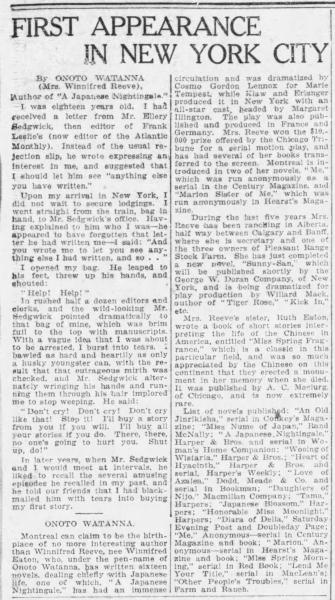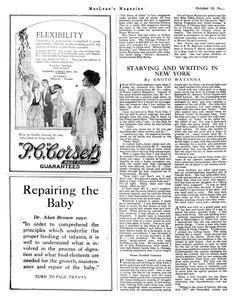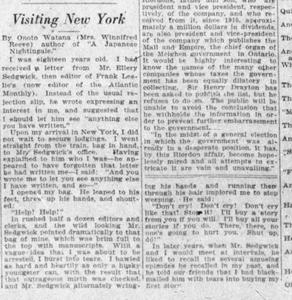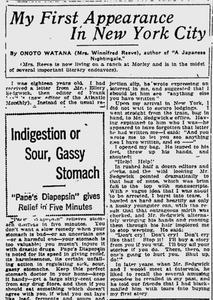I was eighteen years old. I had received a letter from Mr. Ellery Sedgwick, then
editor of Frank Leslie’s (now editor of the Atlantic Monthly). Instead of the usual
rejection slip, he wrote expressing an interest in me, and suggested that I should
let him see “anything else you have written.”
Upon my arrival in New York, I did not wait to secure lodgings. I went straight from
the train, bag in hand, to Mr. Sedgwick’s office. Having explained to him who I
was—he appeared to have forgotten that letter he had written me—I said: “And you
wrote me to let you see anything else I had written, and so…”
I opened my bag. He leaped to his feet, threw up his hands, and shouted:
“Help! Help!”
In rushed half a dozen editors and clerks, and the wild-looking Mr. Sedgwick pointed
dramatically to that bag of mine, which was brim full to the top with manuscripts.
With a vague idea that I was about to be arrested, I burst into tears. I bawled as
hard and heartily as only a husky youngster can, with the result that outrageous
mirth was checked, and Mr. Sedgwick alternately wringing his hands and running them
through his hair implored me to stop weeping. He said:
“Don’t cry! Don’t cry! Don’t cry like that! Stop it! I’ll buy a story from you if
you will. I’ll buy all your stories if you do. There, there, no one’s going to
hurt you. Shut up, do!”
In later years, when Mr. Sedgwick and I would meet at intervals, he liked to recall
the several amusing episodes he recalled in my past, and he told our friends that I
had blackmailed him with tears into buying my first story.
Onoto Watanna
Montreal can claim to be the birthplace of no more interesting author than Winnifred
Reeve, nee Winnifred Eaton, who under the pen-name of Onoto Watanna, has written
sixteen novels, dealing chiefly with Japanese life, one of which, “A Japanese
Nightingale,” has had an immense circulation and was dramatized by Cosmo Gordon
Lennox for Marie Tempest, while Klaw and Erlanger produced it in New York with an
all-star cast, headed by Margaret Illington. The play was also published and produced
in France and Germany. Mrs. Reeve won the $10,000 prize offered by the Chicago
Tribune for a serial motion play, and has had several of her books transferred to the
screen. Montreal is introduced in two of her novels, “Me,” which was run
anonymously as a serial in the Century Magazine, and “Marion Sister of Me,”
which was run anonymously in Hearst’s Magazine.
During the last five years Mrs. Reeve has been ranching in Alberta, half way between
Calgary and Banff, where she is secretary and one of the three owners of Pleasant
Range Stock Farm. She has just completed a new novel, “Sunny-San,” which will be
published shortly by the George W. Doran Company, of New York, and is being
dramatized for play production by Willard Mack, author of “Tiger Rose,” “Kick
In,” etc.
Mrs. Reeve’s sister, Ruth Eaton, wrote a book of short stories interpreting the life
of the Chinese in America, entitled “Miss Spring Fragrance,” which is a classic
in this particular field, and was so much appreciated by the Chinese on this
continent that they erected a monument in her memory when she died. It was published
by A. C. Maclurg, of Chicago, and is now extremely rare.
List of novels published: “An Old Jinrikisha,” serial in Conkey’s Magazine;
“Miss Nume of Japan,” Rand McNally; “A Japanese Nightingale,” Harper
& Bros. and serial in Woman’s Home Companion; “Wooing of Wistaria,” Harper
& Bros.; “Heart of Hyacinth,” Harper & Bros. and serial, Harper’s
Weekly; “Love of Azalea,” Dodd, Meade & Co. and serial in Bookman;
“Daughters of Nijo,” Macmillan Company; “Tama,” Harpers; “Japanese
Blossom,” Harpers; “Honorable Miss Moonlight,” Harpers; “Diara of
Delia,” Saturday Evening Post and Doubleday Page; “Me,” Anonymous—serial
in Century Magazine and book; “Marion,” Anonymous—serial in Hearst’s Magazine
and book; “Miss Spring Morning,” serial in Red Book; “Lend Me Your Title,”
serial in MacLean’s; “Other People’s Troubles,” serial in Farm and Ranch.




